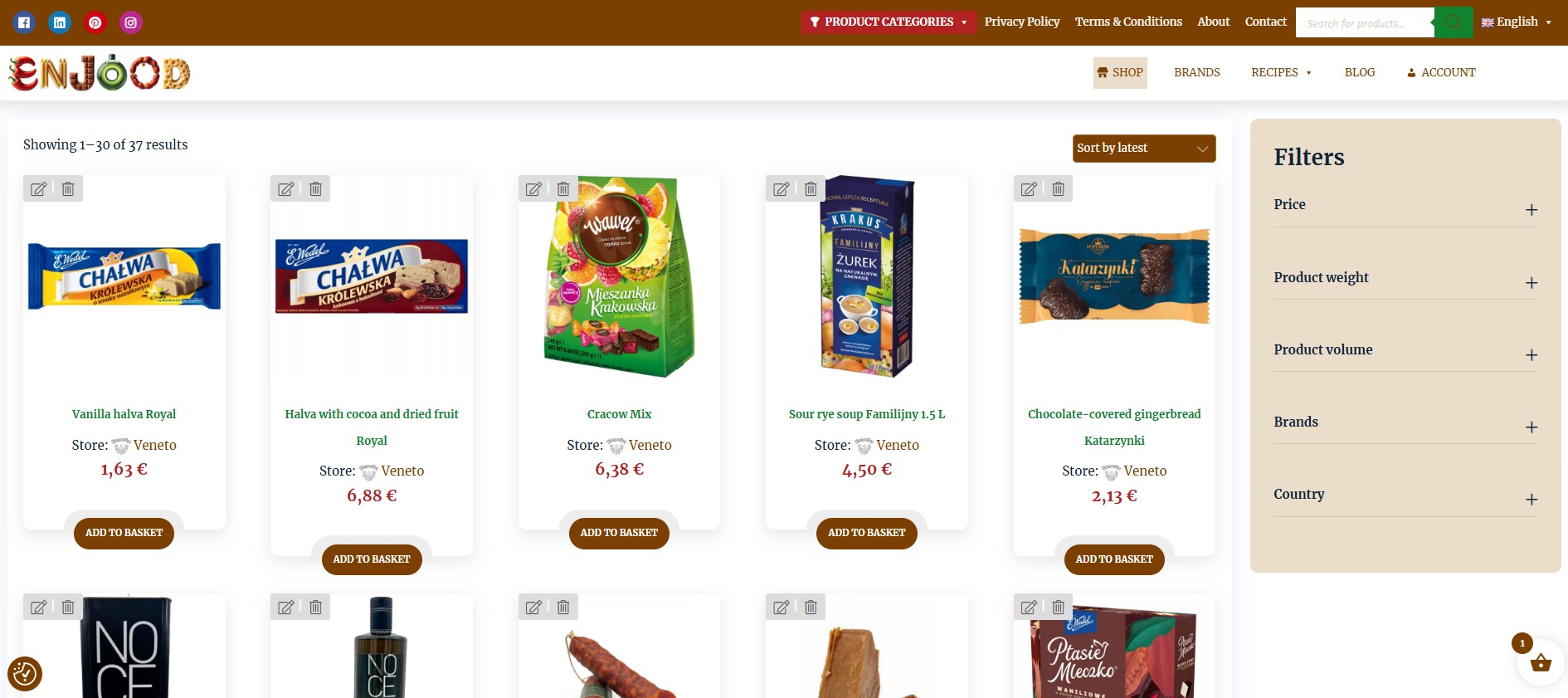Woocommerce multivendor platform Enjood
Enjood is a multivendor e-commerce platform developed on WordPress, powered by the WooCommerce plugin, and designed to serve food enthusiasts and independent vendors across Europe. The platform was built to support a scalable marketplace architecture with multilingual support, automated product synchronization, and a seamless vendor experience.
Address: www.enjood.com
Summary
Project Type: Multivendor e-commerce platform
Technology Stack: WordPress, WooCommerce, Python, Google Sheets API, JavaScript
Languages Supported: 6 (EN, FR, DE, IT, ES, PL)
Key Features:
-
Daily product synchronization via Python script
-
Google Sheets integration for vendor management
-
Custom JavaScript invoice generation
-
Full multilingual SEO optimization
-
Recipes and blog content sections
Platform Overview
Enjood operates as a centralized platform that allows multiple vendors to sell gourmet products and culinary specialties. The structure relies on WCFM multivendor capabilities, extended through custom integrations and automations to ensure efficient product and stock management.
To support its European market coverage, the website is translated into six languages — English, French, German, Italian, Spanish, and Polish. Each language version includes localized product descriptions, adapted SEO metadata, and optimized slugs, ensuring that the site ranks effectively in each target market. This multilingual configuration enhances accessibility, user engagement, and search engine visibility across different regions.

Vendor management and automation
A core feature of the project is its vendor integration system, which simplifies product management through Google Sheets synchronization. Once a vendor’s product is configured on the platform, they receive access to a dedicated Google Sheet, where they can directly manage prices and stock levels.
A custom Python script was developed to handle daily updates automatically. The script runs once per day, reading data from the Google Sheets API and updating WooCommerce products via REST API calls. This ensures that all stock levels and prices remain accurate and consistent across the platform without requiring logging to the shop platform.
This automation has significantly improved operational efficiency, reducing the workload for both vendors and administrators. It also guarantees data accuracy and minimizes discrepancies between available and displayed stock.
Technologies used:
-
WordPress + WooCommerce
-
Python (Google Sheets API + WooCommerce REST API)
-
JSON for credential management
-
Cron-based daily automation
Content and User Experience
Enjood goes beyond a standard e-commerce site by incorporating content-driven sections that enhance engagement and SEO performance.
The Recipes section showcases creative uses of products sold on the platform, providing value-added content that inspires customers to try new dishes. Meanwhile, the Blog section focuses on food culture, cooking tips, and ingredient sourcing — reinforcing brand authority and improving organic search visibility.
This combination of commerce and content helps position Enjood not only as a marketplace but as a culinary hub, connecting users to both products and inspiration.
Customization and Development
Significant customization was implemented to tailor Enjood’s visual identity and user interface.
-
Design Adjustments: Button colors and sizes were customized to align with the brand’s visual palette and improve mobile usability.
-
Multilingual Slider Adjustments: Each language version of the site required precise synchronization of slider translations to maintain a consistent visual experience across all versions.
-
Custom Invoice System: A JavaScript-based solution was developed to generate dynamic invoices directly from WooCommerce orders, adapted for the multivendor setup.
These changes required a deep understanding of WordPress hooks, WooCommerce templates, and JavaScript DOM manipulation to extend native functionality without compromising site performance.
SEO and Performance Optimization
Each product and page on Enjood was configured with SEO best practices in mind, including structured data, meta tags, and localized keywords. The site also benefits from an optimized URL structure for each language, ensuring improved crawlability and ranking potential.
Through caching configuration, image optimization, and plugin performance tuning, Enjood maintains fast loading times despite its complex multilingual and multivendor structure.
Outcome
The Enjood project demonstrates how open-source flexibility and custom automation can be combined to create a professional, scalable multivendor platform. With its multilingual structure, content-driven approach, and robust backend automation, Enjood delivers both operational efficiency and an engaging user experience — positioning it as a modern e-commerce solution for the European food market.

